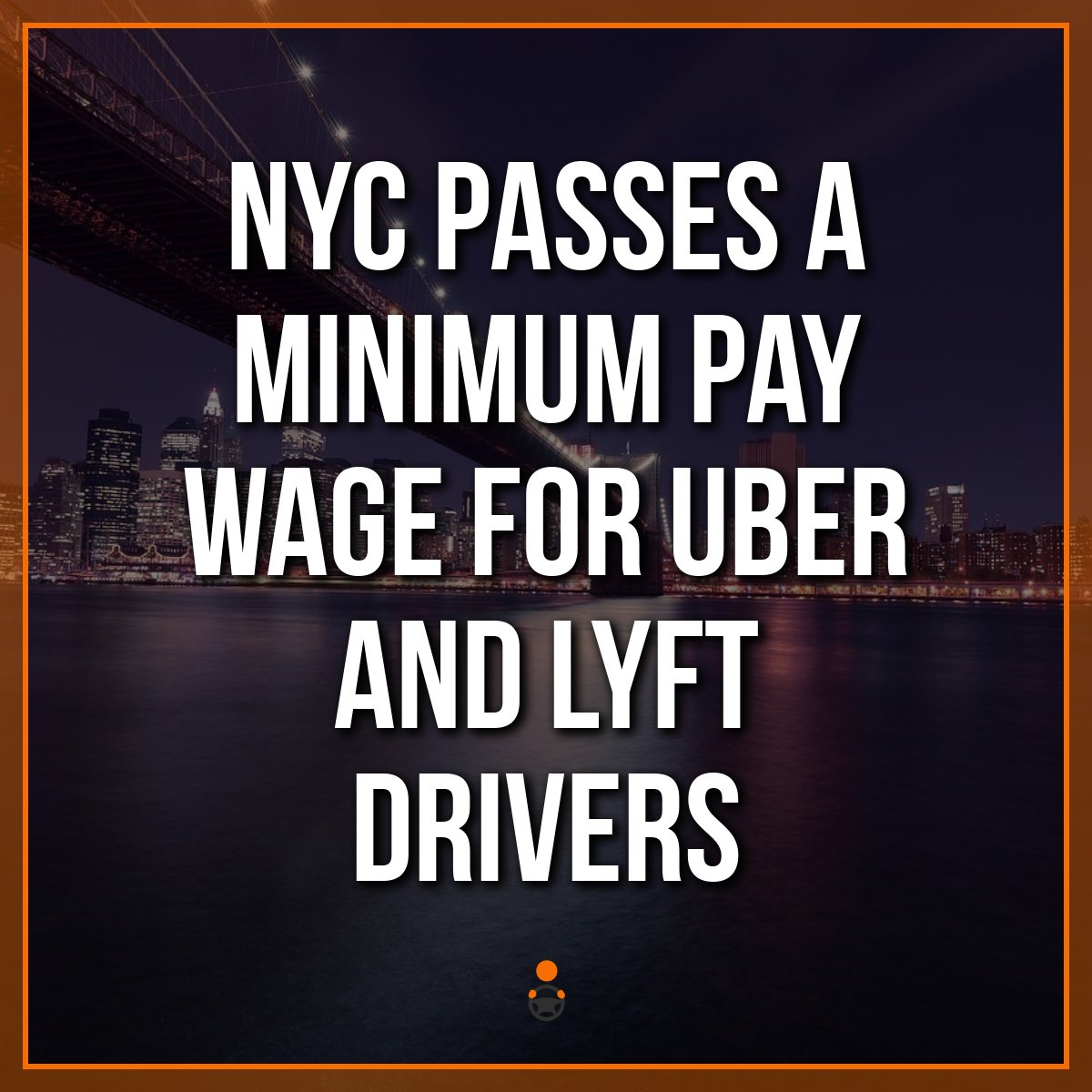Join us for our December YouTube live on Tuesday December 11 at 4pm PT! You can subscribe to our Youtube channel here and be sure to turn on notifications (instructions here) so you know when we go live.
It was a big news week for all of the major players in the ridesharing industry this week, including Bird/Lime and a brand new ridesharing platform, inDriver. Senior RSG contributor John Ince covers all that, plus NYC’s minimum pay wage for Uber and Lyft drivers, below.

NYC passes minimum pay wage for Uber and Lyft drivers [Engadget]
Sum and Substance: App-based contract drivers will receive $17.22 per hour going forward. New York City’s Taxi and Limousine Commission voted today to establish a minimum wage for drivers working for companies like Uber, Lyft, Juno and Via.
The city is the first in the US to set a minimum pay rate for app-based drivers. Going forward, the minimum pay will be set at $17.22 per hour after expenses, bringing it in line with the city’s $15 per hour minimum wage for typical employees, which will take effect at the end of the year.
The additional $2.22 takes into account contract drivers’ payroll taxes and paid time off…
Across the US, there’s been increased scrutiny on what companies like Uber and Lyft are actually paying their workers. In May, San Francisco subpoenaed the two companies for their pay records, and both companies have faced lawsuits over driver wages. Last year, NYC began requiring all ride-hailing services to offer an in-app tipping option.
The rules passed today aren’t sitting well with the companies affected by them, however. Lyft told Engadget that it’s concerned that calculating pay per ride rather than per week will incentivize short rides over long rides. Further, Lyft says the new out of town rates — which require companies to pay drivers more when they take passengers outside of the city and return without a passenger — will be hard to implement before the new regulations take effect in 30 days…
The TLC’s rules does not take into account incentives or bonuses forcing companies to raise rates even higher. Companies use incentives and bonuses as part of driver earnings to ensure reliability citywide by providing a monetary incentive to drivers to complete trips in areas that need them the most (such as outside of Manhattan).
In addition, the rules miss an opportunity to immediately deal with congestion in Manhattan’s central business district…
My Take: When they write the history of ridesharing, this legislation may one day be viewed as a watershed event. It will mark to turning point from an unregulated industry to a regulated one. It will be seen as the moment when the interests of drivers were seen as integral to the development of a healthy infrastructure for ridesharing.
Unfortunately, it took the tragic self-inflicted deaths of several drivers to dramatize the plight of the drivers. Let’s take a moment to recognize their heroism and how their actions, tragic as they were, have improved the lot of drivers, not just in New York City, but all the other cities where actions like this will inevitably follow.
Meanwhile, in San Francisco and other cities, Uber is adjusting their fare structure – and selling it as a way for drivers to make more, while anybody in the know can see it as another disguised wage cut.
Read more about Uber’s rate changes here.
Uber may acquire Bird or Lime to accelerate its scooter plans [Engadget]
Sum and Substance: Uber might see its acquisition of Jump as just the start of its e-scooter ambitions. Sources speaking to The Information claim Uber has “recently” held talks to buy Bird and Lime, two of the biggest names in scooter sharing. The move would reportedly help Uber tackle scooter shortages that limit its growth, and would help it snap up vulnerable competitors who are still scrambling for funding.
While there’s no guarantee a deal could happen, Uber might reach a deal to buy one of the companies before 2018 is over… Bird chief Travis VanderZanden said Bird was “not for sale,” but a spokeswoman acting on his behalf didn’t say if the company had talked with Uber…
My Take: This rumor, now circulating throughout the tech world, just underlines how insular the ridesharing world has become. According to several reports, both Bird and Lime are looking for more investment, so they have an incentive to talk with Uber. Because Uber has been the beneficiary of investor largesse, they’re flush with cash and have a stock that, to this writer seems, inflated.
But as long as you have an inflated valuation ($70 billion in the last financing round with Softbank), why not use it to acquire other companies that have acquired a certain cache – like Bird and Lime. And so it goes.
Suddenly the valuations of the companies rumored to be valuation targets get inflated too – with one rumor putting a price tag of $2 billion on Uber’s prospective acquisition of Bird. This is all happening inside a very close and small circle of investors. When the companies go public in 2019, all that will change – and suddenly Uber’s numbers (including quarterly losses of almost $1 billion) will be subject to close scrutiny.
When that happens, I expect prices will come back to earth. Watch closely here. What’s ahead may not be pretty, especially if the economy takes a downturn by 2019.
How Lyft’s IPO could challenge Uber’s dominance abroad [Marketplace.org]
Sum and Substance: This morning, the ride-sharing company Lyft announced it has filed papers to go public. Word is that its IPO will happen sometime early next year. An early 2019 IPO would likely happen before Uber’s expected IPO, which is also reportedly planned for 2019.
Uber is currently valued at anywhere from $60 billion to $120 billion, nearly eight times Lyft’s $15 billion valuation. This despite Uber’s numerous scandals, while Lyft has remained relatively scandal-free…
My Take: We’ve all known for months that this was coming. The only element of intrigue was whose IPO comes first, Uber or Lyft. With the stock market showing signs of retrenchment, Lyft first mover advantage could prove to be significant – especially if the market continues it dive well into 2019. Timing is everything in the world of finance, and Lyft’s timing is looking pretty good right now. But stay tuned. Things could turn on a dime.
Waymo launches self-driving car service Waymo One [Techcrunch]
Sum and Substance: Waymo, the former Google self-driving project owned by parent company Alphabet, is launching a commercial robotaxi service in the Phoenix area Dubbed Waymo One, this milestone for the company and nascent self-driving technology industry comes with caveats.
The Waymo One self-driving car service, and accompanying app, won’t be available to just anyone. And for now, the company says it will have Waymo-trained test drivers behind the wheel (even though the company already has driverless vehicles on public roads in Phoenix).
Waymo will first invite Phoenix residents who are part of its early rider program, which was designed to give a vetted group of people the ability to use an app to hail a self-driving vehicle…
Unlike, the early rider program, Waymo One users will be able to publicly share their impressions on the service. It also cracks the door to the public because Waymo One users will be able to bring along a friend or family member who weren’t part of the early rider program.
The service will be available in a defined area in Phoenix 24 hours a day, 7 days a week beginning in Chandler, Tempe, Mesa and Gilbert, the company said. The service will slowly expand into new neighborhoods and suburbs in the greater Phoenix area.
My Take: While still far away from completely autonomous vehicles, this still is a significant milestone because it’s opening the experiment to public scrutiny. Each of the selected passengers will have an opportunity to share their experiences, and you can bet there’s going to be a lot of publicity surrounding this.
Waymo / Google / Alphabet again seems to be proceeding in measured, sensible steps. For this reason, I continue to place my bets on them to maintain their lead in this high stakes new industry.
Priceline Meets Uber In A Name-Your-Fare Ride Service Arriving In New York [Forbes]
Sum and Substance: A ride-hail app new to New York lets you set a price for your trip (sort of). There’s a $15 minimum and its nearby drivers can accept your fare or counteroffer. It might become a haggle session, or it could ease a major pain point of using ride-hail in crowded cities: shocking fares…
inDriver, a ride-hail app newly based in New York after growing internationally since its Yakutsk, Siberia launch in 2012, believes it can make everyone happy. It first balanced such competing interests in a legendarily cold Siberian winter. Taxi drivers, not Uber drivers, jacked up prices when it was -45 degrees Celsius and locals took matters into their own hands, negotiating ride prices via a social network as the Independent Drivers group…
So why start U.S. operations here? The sheer volume of commuters going in and out of Manhattan every day, people who would prefer some form of for-hire transportation over public transit if it could be made affordable. inDriver North America CEO Sasha Ozeran said in a phone interview that according to inDriver’s own research, over 4 million people commute every day in and out of New York.
A longer ride — one to or from an outer borough — places those commuters above inDriver’s $15 minimum fare, the sweet spot where a passenger saves money but the driver can still earn. And even above that minimum, a driver can seek to shift the offer in 10 percent increments. “We are fair not only to passengers but to the drivers as well,” Ozeran said. “We don’t penalize drivers for not accepting a ride.”
Editor’s Note: This service reminds me a lot of Sidecar (RIP) and, while they seem like an attractive option for drivers, getting passengers is the name of the game. As we saw with Juno, in order to make this lucrative and viable for drivers, riders must be incentivized to first join the platform. At this point, I’m not sure how inDriver is going to do that without offering steep discounts.
Readers, what do you think of this week’s round up?
-John @ RSG




